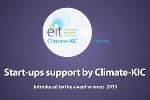Water and Energy for Climate Change (WE4CC-II)
Challenge Platform: Sustainable cities
Project Start Date: 08/2013
Lead partner: Netherlands Organisation for Applied Scientific Research (TNO), NL
Project type: Innovation – Develops and brings to market climate relevant knowledge, products and services
Project lead: Willy van Tongeren, TNO, <willy.vantongeren@tno.nl>
Partners
The WE4CC-II project involves 4 partners:
- Netherlands Organisation for Applied Scientific Research (TNO) (Climate KIC Core Partner)
- TU-Berlin (Technical University) (Climate KIC Core Partner)
- Laborelec/GDF Suez, France (Climate KIC Core Partner)
- Naked Energy, UK
Concept
Water purification is needed to produce high quality water for consumption, agriculture and industrial needs. Conventional water treatment processes, like distillation and reverse osmosis, consume vast amounts of energy. However, there is a large potential for significant reductions in energy consumption and CO2 emissions in this sector. It can be achieved by the exploitation of waste heat for water production and climate control with new technologies such as membrane distillation and water recovery from desiccant solutions.
Humidity control in air treatment is regularly connected to condensation processes using heat pumps. The use of liquid desiccants for air dehumidification is a new technology, which allows their use in applications like dehumidification of exhaust air within heat recovery units and of supply air within air conditioning. Further applications exist in greenhouse air dehumidification and industrial drying. Hence, significant energy savings can be achieved by regenerating diluted desiccant solutions using, until now, unexploited industrial waste energy.
The Climate Change Issue
Waste heat is produced by a lot of processes that use energy. The biggest contributors to waste heat are industrial processes, domestic processes and energy production. Often, this waste heat is lost to the ambient environment, contributing to a rise in global temperature. Storage and reuse of this waste heat could contribute to improving energy efficiency and reduction of CO2 emissions.
The Project Solution
In the WE4CC-II project an advanced membrane distillation technology (Memstill) is evaluated for the production of demineralised water and drinking water using low grade heat. Membrane distillation is a thermally driven separating process where water vapour passes through a hydrophobic membrane and high quality liquid water is retained. This process is triggered by the difference in water vapour concentration across the membrane. By using waste heat to drive the process, energy consumption is cut and no excess heat is wasted.
Two processes have been utilised to put membrane distillation into practice:
• Memstill: partial use of waste heat
• Memstill with additional heat envelop (MD-HEX): full use of waste heat
WE4CC-II uses these membrane distillation technologies with an aim to commercialise the potential for waste heatwater techniques.
For air dehumidification, a market for future users of liquid desiccants (heat recovery, supply air drying and precise humidity control in buildings, dehumidification of greenhouses, drying of industrial goods) has to be prepared by developing a number of pilot projects, showing the technology and its specific contribution for power saving. Furthermore, industrial waste heat suppliers will be needed for the regeneration part of the desiccants. Desiccant networks can be envisaged as a new way of energy storageand transport under use of today unexploited waste heat sources, especially as applications of air de-humidification and regeneration services will regularly not be found on the same place.
The aim is to connect stakeholders in low grade heat production (waste, solar) with water – air networks. Reuse of low grade heat for high quality water production and air conditioning can substantially reduce energy consumption and CO2 emissions. Using unexploited waste heat from cooling water can reduce electricity consumption by up to 50% relative to water production using fossil fuels.
The Role of Climate-KIC
Climate-KIC has assisted the WE4CC-II project by providing a vast network of potential partners. Climate-KIC meetings and conventions offer opportunities to make contacts and widen networks for innovators.



